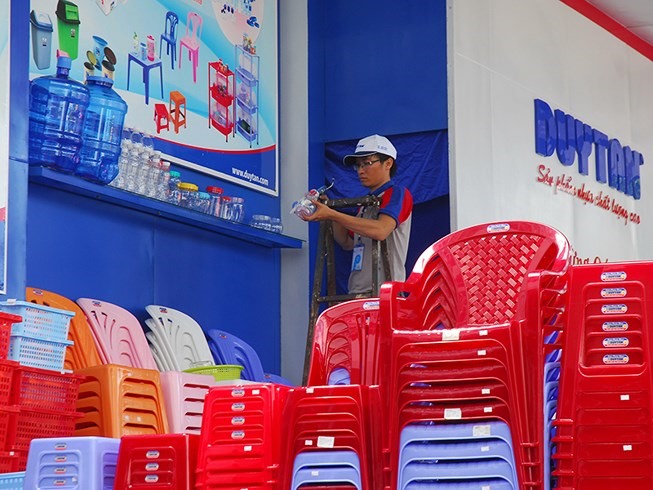The massive increase in the number of M&A deals involving foreign investors is putting pressure on Viet Nam’s plastics industry.

The massive increase in the number of M&A deals involving foreign investors is putting pressure on Viet Nam’s plastics industry.
Many large local players in the plastics sector are gradually falling into the hands of Thai, Korean and Japanese firms.
According to the Viet Nam Plastics Association, in 2017, the total value of plastics exports in Viet Nam reached over $3 billion, up 17.6 per cent over 2016.
Massive deals
Thailand’s Nawaplastic Industries (Saraburi) Company, an affiliate of Thailand’s SCG Group, has officially announced plans to increase its stake in the Binh Minh Plastics Company (BMP), a leading firm in Viet Nam’s plastics industry, to 51.10 per cent.
SCG Group also plans to invest up to US$6 billion to strengthen its position in the Vietnamese plastics industry from now until 2020. Notably, SCG had also spent $121 million on shares in seven Vietnamese plastic companies.
Besides BMP, another leading player in the plastic industry is Tien Phong Plastic Joint Stock Company (NTP). Japan-based Sekisui Chemical Company has replaced SCG to become NTP’s major shareholder.
Ho Duc Lam, chairman of the Viet Nam Plastics Association (VPA), told Phap luat thanh pho Ho Chi Minh (HCM City Law) newspaper that Thailand is gradually penetrating the Vietnamese plastics market with professional distribution systems. For example, Thai plastic products are given priority of distribution at the wholesale centres of the Metro supermarket system across Viet Nam.
In addition to Thai firms, Korean players are also eyeing the Vietnamese plastics market. After acquiring Minh Viet Packaging Company from Masan Group, South Korean Dongwon Systems Corporation has collected shares of Tan Tien Plastic Company in the market.
Tan Tien is one of the leading units in the field of composite packaging for the food industry, with an average annual turnover of VND1.3-1.5 trillion. Most of Tan Tien’s customers are big names such as Unilever, Ajinomoto, Acecook, Trung Nguyen and Vinamilk.
Korean Dongwon has become a major shareholder of Tan Tien, holding a 97.83 per cent stake. After acquiring Tan Tien, key positions on the company’s board of directors were replaced by Koreans.
Japanese firms are also showing their interest, with many M&A deals made. Japan-based MeiwaPax Group spent $16.5 million buying Sai Gon Trading and Packaging JSC (Saigon Trapaco). Another Japanese company, Oji Holding Corporation, acquired United Packaging Company Limited in Viet Nam. Sagasiki Viet Nam bought Goldsun Printing and Packaging JSC.
Pressure increases
The massive influx of investment from foreign investors into the plastics industry, according to economist Dinh The Hien, is aimed at taking advantage of investment incentives for land, taxes and material prices, energy, as well as cheap labour to save costs and achieve the best profit.
Viet Nam’s participation in a series of free trade agreements had also brought advantages to foreign businesses, Hien said.
"With the strong capital injection into the plastics industry, foreign companies are taking advantage of the value chain from input to output that they have built in Viet Nam. For example, Thais have set up plastic factory systems and a wide distribution network in the country.
This puts high pressure on local companies, especially in the context that the majority of Vietnamese plastic enterprises are always short of capital, technology and qualified human resources.
The difficulties faced by local companies also come from a dependence on imported raw materials. The plastics industry always requires high operating costs for production, therefore, if external factors such as exchange rates, interest rates and import tax policy suddenly change, the firms’ profits will immediately be hurt,” VPA Chairman Lam said.
To stand firm in the market, a representative of Rang Dong Plastic Company said it was trying to change.
“Our current strategy is to identify the target product and target customers. In order to approach fastidious customers, we invest in technology, machinery and equipment at each stage of production so that the products have high accuracy in terms of size and low price, thus enhancing competitiveness,” the representative said.
Opportunities
According to the VPA, consumption of plastic per capita will increase to 45 kilograms per person per year by 2020, equivalent to a growth rate of 4 per cent per year. The real estate and construction sectors will continue to recover in the coming years, promoting plastic products used in construction.
According to the Ministry of Industry and Trade, many Vietnamese plastic companies have imported the most advanced technologies in the world to produce products that meet international standards so as to qualify their products for export to fastidious markets such as Europe, the US and Japan. — VNS





